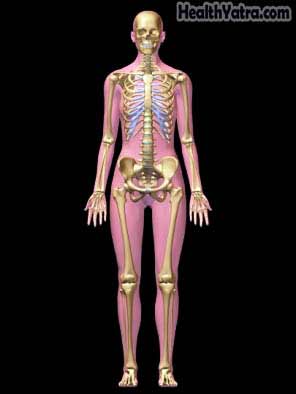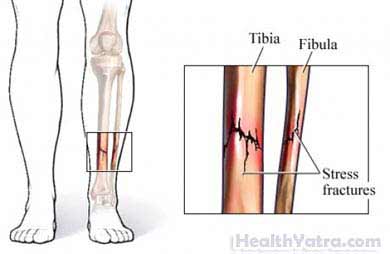Definition
A bone scan is a test that detects areas of increased or decreased bone activity. These may indicate bone injury or disease. Radioactive isotopes and tracer chemicals are used to highlight problem areas.

Reasons for test
The test is done to detect an abnormal process involving your bone, including the following:
- Stress injuries (such as, stress fracture, shin splints)
- Infection ( osteomyelitis)
- Arthritis
- Bone tumors
- Cancer
- Trauma
- Metabolic disorders (such as, Pagets Disease)
- Nutritional disorders that can affect bones, like low vitamin D levels (for example,rickets)
- Death of an area of bone tissues due to blocked circulation ( avascular necrosis)

Possible Complications
Complications are rare, but no procedure is completely risk free. If you are planning to have a bone scan, your doctor will review a list of possible complications, which may include:
- Allergic reaction to the injected material
- Infection
Some people worry about the use of radioactive material in a bone scan. The amount of radioactivity is very small, though larger than you would receive from common x-ray procedures, like a chest x-ray or dental x-ray. The radioactive material is eliminated from the body within 2-3 days.
Be sure to discuss these risks with your doctor before the test.
What to Expect
Prior to Test
Tell your doctor if you are pregnant or breastfeeding. You may need to discard breast milk for several days after a bone scan.
Tell your doctor if you have recently had anything that contains barium (for example, contrast dye) or bismuth (found in some medicines).
Three hours before the scan, you will receive an injection of radioactive tracer chemicals. You should drink plenty of fluids between the time of the injection and the scan. You will also be asked to empty your bladder before the scan.
Description of the Test
You will lie on your back on an imaging table. A camera above and below the table will slowly scan you. You may be asked to move into various positions as the scan is done. It is important to lie still when not told to move. The camera will be able to detect small amounts of radioactivity in the injected material. This will allow the doctor to see areas where there may be bone injury or disease.
After Test
The injection site will be checked for redness and swelling.
How Long Will It Take?
You will be in the scanner for 20-60 minutes. Sometimes another scan is done after 24 hours.
Will It Hurt?
No, the test is painless, except for the mild discomfort of the injection.
Results
If your bone tissue is healthy, your scan will show that the chemical has spread evenly to all of your bones. If there is an area of disease, darker or lighter areas (hot or cold spots) will be evident on the scan. These will show the areas with abnormally active bone breakdown or repair.
Depending on your results, you may need further tests, such as:
- X-ray —a test that uses radiation to take a picture of structures inside the body, especially bones
- CT scan —a type of x-ray that uses a computer to make pictures of structures inside the body
- MRI scan —a test that uses magnetic waves to make pictures of structures inside the body
- Bone density test
- Biopsy
Call Your Doctor
Call your doctor if you have questions about the test, your condition, or your test results.
In case of an emergency, call for medical help right away.
